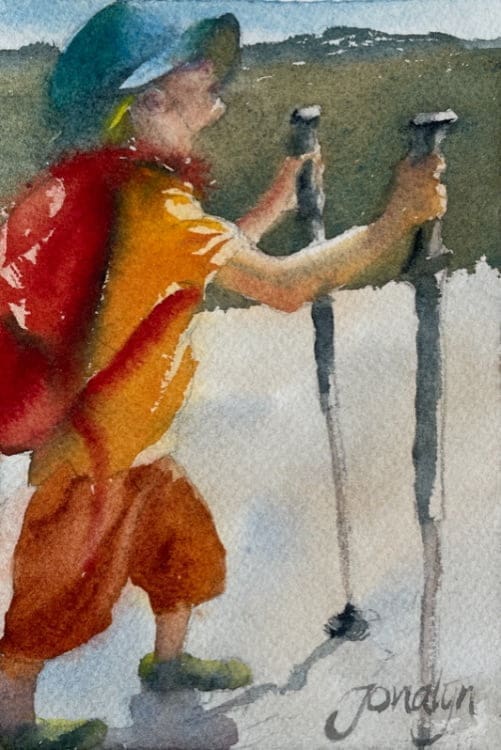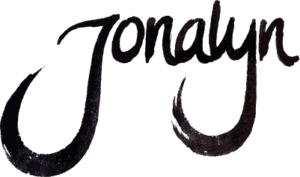— The War of Art, Steven Pressfield
All journeys of consequence begin with small steps. Creative work means fighting what Steven Pressfield calls “the resistance”. I think we are fighting deeper forces than simply inertia and laziness. I believe the enemy of our souls is invested in destroying our creative powers. Hitler is a case in point (see opening quote).
So when I decided to leave pastoral ministry at age 38 and take up painting watercolor, I was asking for it.
Learning to paint watercolors in my 40’s means I face off with resistance daily. I commit to paint when no one cares, when it’s ugly, and when I’m frankly embarrassed of the result. Working as an artist means I daily show up to keep trying. And my amateurish paintings grow less amateur each day. But, I’ve been painting daily for three years, and still the steps are small.
Most days I do not feel proud of what I’m painting. I am annoyed at how long it takes. So, I read books that encourage me to show up (The War of Art: Winning the Inner Creative Battle is quite good). In the process, I’ve become more familiar with my perfectionism.
~~~
Once I posted an Instagram image of this quote “Perfectionism is where fun goes to die.” I had several people ask me where they could get that book. It wasn’t a book, yet. Maybe one day it will be.
Their response revealed what we all know: perfectionism is rampant among us. We think we need perfectionism to keep us in line. That dependence is reflexive, addictive in us. We should sit up and notice. Perfectionism is actually a symptom of a bigger addictive disease: co-dependency*. I introduced codependency and it’s connection with narcissism last time (How Special Do You Need to Be).
Today, I want to focus on how creativity of all kinds (writing, child-rearing, inventing, entrepreneur-ing, care-taking, educating, designing, painting, composing, drawing) brings out our perfectionism.
Nowhere is this more evident than when our children try to draw.
~~~
Most Mondays, I teach my boys how to draw and paint. Sometime, they’ll finish a picture and announce, “I can’t do it. I hate it.” Tears sometimes accompany this statement.
How would you respond to a child who hates what they’ve just created? If you’re like me, you’ll want to contradict,
“Oh no, honey! It’s great!” Praising them while they look at you, dubiously. Discomfort with a child’s self-critique, especially when it comes to art, is very common among adults. However, we don’t hesitate to encourage self-critique with math, or science, or grammar.
“3 + 8 = 12. Wait, that’s not right,” our child says.
No anxiety to soothe in us, we calmly reply, “Yep, you missed that one. What’s the correct answer?” And we check to be sure they know that 3 + 8 = 11.
In math, we’re confident of the answer. With art, we are less certain. Most of us have some baggage about creativity. We might not know what counts as good art, we might think it’s about expressing or just trying. Maybe we remember we “can’t draw a straight line.” Regardless of the reasons, when our young child rightly critiques his own work, we contradict them. We steer them away from facing the huge gap between how they draw and how they want to draw. And we tip our hand.
We are perfectionists. We cannot sustain the slow work of growth. We cannot face the gap in their ideals and their performance because we don’t know how to bridge the gap. We smother our ignorance with pretending it’s just fine as is. When to our kids, it’s obviously not.
We pin their childish, sweet drawings on our walls to prove to them: we are proud. We recognize an ability in them to try new things, an ability we have lost. But, unless we can face their imperfections, we seal our dysfunction into them. too. Let me suggest another way to respond to them. Because art is perhaps the clearest place we pass along the prefectionism infection to our children.
“I hate this. It’s very bad.”
“Tell me what you hate about this.”
They might say it doesn’t look like they expected, or the colors are wrong, or it is messy. Regardless of what they say, we can respect their evaluation. When we do this, we honor their desire to grow. We can ask them,
“What would you like to do?” And we can find ways to make their next steps possible even if they want to throw the artwork away, start over, or try again tomorrow. This week I came up with an idea, to become their “Eraser Truck” and whenever O yelled “Eraser Truck” I would swoop in and ferociously erase his attempt to draw a mug. He tried several times, and there were lots of pencil smears. Honestly, I thought his second, third and fourth attempts were just great. But I kept my mouth shut (gold star for me!). And let O be the higher ranking evaluator of his work.
By accepting O’s evaluation, I give him space to see the gap between the current skills and where he wants to be. I am squaring off with the perfectionism in my heart, the lie that says, “Our children should love everything they create.” How impossible is that fantasy?! Perfectionism in me. And just so we are clear, perfectionism is a tell-tale of codependency*. There are many other characteristics but we’re taking them one at a time. That’s another way to fight perfectionism. Small steps. 😊
With God’s help, we can say “No, this isn’t going to infect my kids, too.” This acceptance of the process is how we take a tiny steps of growth, out of perfectionism. Imperfectly.
~~~
Expect backwards steps, circling steps. Expect slides down the hill. Expect yourself to be unable to stomach your child’s ruthless self-criticism. Expect your child to remind you of your own self-talk (Yikes, right?!). Expect your own creativity to be blocked, your third draft to impossibly disappear. Expect WordPress to crash. Expect your family of origin drama to erupt as soon as you pick up a paintbrush. Expect the resistance. Expect ugly paintings without an audience, without sales. Years of this.
Perfectionism can only be dealt with imperfectly. Sometimes I announce (yep, out loud), “Today I’m going to paint an ugly tree!” And when I prove prophet, I sadly clean my brushes and repeat, “I got my brushes wet, I got my brushes wet. ”
Facing the music, taking the next step, expecting ugly things along the way. It’s the work of creativity. It’s revolutionary because we must face off with the enemy of our souls to do it. He hates it when we put ourselves in a humble place of showing up, for that’s when God works his miracles.
Never forget, we have assistance, we have the ultimate Helper. It’s no accident that the first time the Spirit of God filled a human being, it was an artist (Exodus 31:1-5). All creativity is an act of God indwelling us and us cooperating with his invitation. Some call it the Muse, the spirit, the universe, the stars, synchronicity, horoscopes. But, I know His fingerprints. He doesn’t demand we heal perfectly. He still shows up when we show up. And he is the Great Physician, the healer of all addictions. He can heal us of perfectionism and even codependency.
He can return us to the courage to create even when we must erase again and again.

*Codependents, like all addicts, are characterized by: dishonesty (denial, projection, delusion), not dealing with feelings, control, confusion, perfectionism, fear, rigidity, judgmentalism, depression, inferiority/grandiosity, self-centeredness, external referencing, etc. For a codependent, one fudged truth about who they really are is like a first drink for an alcoholic. Codependency has diseased most our relationships, in the family, the church, in education and politics. And our culture is invested in keeping people away from healing. For a short, smart book on the topic see Co-Dependence: Misunderstood-Mistreated by Anne Wilson Schaef.





8 Responses
“[The enemy of our souls] hates it when we put ourselves in a humble place of showing up, for that’s when God works his miracles.” Thank you, Jonalyn, for the wisdom of these words. For showing up for this blog, putting pen to paper, and being vulnerable enough to share your experience. Seeing the beauty and depth of your paintings, it’s so surprising – and yet refreshing – to hear about your experience in creating. I have really struggled to show up and create in the past season, and this post was a major encouragement. As a homeschooler myself, your experience in guiding your own kiddos resonates as well. Thank you for illustrating in such a poignant way what true Christian humility looks like, as well as reminding me of the joy of Imago Dei in me when I show up to create. I feel a new expectancy for His miracles. Well done.
Dana,
You are the reason I write, to know another friend and like-minded soul is reading my words and benefiting. AH! It’s similar to how I feel when someone buys my art. I can’t think of a better compliment than what you wrote here. Thank you!
Let’s keep creating and showing up with our little ones. They are our best and bravest audience. I want to grow my soul so that a standing ovation from these two boys is enough and running over. One day, I’l get there. Baby steps for us both. 💪🏼
Thank you, my friend.
Very much appreciate your thoughts, Jonalyn, thank you for writing and sharing insight into your creative process.
So much to talk about! I have always struggled with perfectionism, too, and finally, in my late 50s, am finding some success over it. I do think it helps to get feedback from others, both yea and nay, but especially yea, because I tend to focus only on what I don’t like about my work and miss what’s good about it. Or I will think that “good” has to mean perfect, that all the details are perfect, not that the overall effect is good.
I have also found that, often, if something doesn’t go the way I wanted, I can actually go with it and take the work in a slightly different direction, and it will end up great after all, if not quite what I was planning or expecting! This has become part of the fun of creativity for me. Yes, there is excellence in mastery of technique, but glitches will always come, and the real masters know how to incorporate the glitches into a lovely final product.
I am not an expert, but have looked at a lot of art in my life, and I see a lot of talent and accomplishment in your painting! Always thought I wanted to pursue painting in my empty-nest years, but don’t have near the ability that you do. I am glad that I discovered cake decorating, because it is the outlet I always wanted, and I have finally found a medium that I think I actually have the talent for. But, keep getting those brushes wet, Jonalyn; to my eye, you are doing a whole lot more than that!
Hello Bonnie,
Some of my favorite people to talk with are women in their 50’s and 60’s who’ve faced their perfectionism. And yes, feedback is a huge help. More on that in a moment.
I’m finding good enough in my painting as well. I’m finding that honesty with what I can paint today and accepting it as part of the steps is a way I honor honesty. A perfect painting is no match for a record of my honest vision today. This is how I painted trees, and I can look fondly and kindly back on how I used to paint them. And celebrate that they’re better and lovelier today. Both parts, though, are worthy of acceptance. And this is that goodness you’re talking about. The process is itself good!
Watercolor is precisely that medium where happy mistakes can lead to unexpected beauty. I’m often so grateful for them, they show up in almost every piece. Just like parenting, marriage, friendships, life! I bet cake-decorating too?!
And thank you for these kind words of delight over my painting. One of the reasons I built this site was to find an audience that I could be nourished by and enjoy. You are an answer to that prayer. 🤗
You know how rare it is to take this perspective in teaching art to kids?! I literally don’t think I have ever heard anyone say some of this stuff. But it is so right.
(My kids who are trying to improve and self-critique hate it when I tell them *I* think it’s amazing art. They have come to say they can’t rely on my feedback because I will always like it. 😳)
Thank you, Erin. I really appreciate your honesty. There’s a good book about how to teach art that first brought this to my attention. I’ll link it here. I highly recommend it for teaching art to kids https://www.amazon.com/gp/aw/d/0874778271?psc=1&ref=ppx_pop_mob_b_asin_title
Oh this is a topic I have been grappling with a lot lately. I am a classical musician, an opera singer. I would also label myself a reformed perfectionist, as in I used to strive for perfection. That was always the goal, but it was so destructive because it isn’t attainable. It led to a lot of negative self-talk, fear, doubt, feelings of inferiority and even hopelessness. Finally, I was like this isn’t worth it. I am a good singer, a good artist, and I need to change the way I think about this. So, I began focusing on progress not perfection, and it’s WAY more fun. I thought I had really overcome this until I had to make new video recordings for auditions a few weeks ago, and perfectionism reared it’s ugly head again. I wanted my videos to be perfect. It added a lot of extra stress to the process and sucked out the joy until I said “I’m not doing this anymore,” and I let go of the need for perfection. Then, I sang great. Funny how the letting go of the need to be perfect actually enabled and empowered me to create better art and enjoy the process more. It was a life changing moment for me, and quite frankly an answer to prayer. I asked God to change my perspective on how I viewed making video recordings, and he did. I don’t dread it anymore.
I’ve been thinking a lot about why art and perfectionism are so intertwined and why so many artists struggle with it, and I think it is somehow tied into the idea that perfection is the ideal of beauty. We see this in our culture all the time, especially with magazines photoshopping bodies to make them look perfect which creates unrealistic and unattainable ideals. It can be seen in movies, music and other areas of culture too causing us to chase goals we can’t reach and teaching our kids false standards., but the approach you outlined above is the antidote for perfectionism. Show up. Be kind to yourself. Talk to yourself like you would talk to your kids and identify something about the art you want to improve. Focus on that. Enjoy when it’s improved and repeat. This is the creative process that will enable us to keep creating. It’s the one that brings life instead of death, growth instead of destruction and joy instead of self-loathing. Thanks for calling this into the light, Jonalyn. So many need to hear it. Thank you also for your bravery in continuing to make art. I love your work. You bring so much beauty to this world.
Ashley,
This comment reveals an enormous amount of work in your soul. You’ve been working the program, girl! It’s inspiring, freeing, delightful and refreshing to read your words.
I really appreciate hearing your “circle back” to keep practicing release of the perfect performance. And I think you’re correct about beauty being (falsely) linked to flawlessness. But I’ve never created anything I’ve valued without a big mess. Never.
I am actually starting to like the mess, to feel affectionate for the steps along the way. I will keep asking God to grow that affection and care for the journey. Thanks for joining the conversation here 🤩